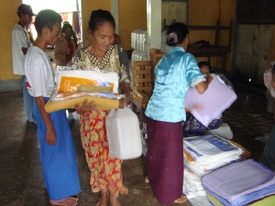Aug 25 2008
BASF donated 100,000 INTERCEPTOR® malaria nets to the relief efforts following cyclone Nagris in Myanmar. The company channeled 75,000 nets through the well-known U.K. based emergency response agency “The MENTOR Initiative” and another 25,000 nets through the Thailand Red Cross.
 BASF works with The MENTOR Initiative and the Red Cross to get 100,000 malaria nets to cyclone victims in Myanmar
BASF works with The MENTOR Initiative and the Red Cross to get 100,000 malaria nets to cyclone victims in Myanmar
Since cyclone Nargis hit the country past May, there has been an increase in malaria and dengue fever. As the flood waters recede, mosquitoes have found a prime environment for breeding in the new wet surfaces left behind. This dynamic makes the distribution and use of INTERCEPTOR® a vital part of the emergency relief effort, particularly because of its efficacy; INTERCEPTOR® continues to kill mosquitoes even after 20 washes.
“We have been working with The MENTOR Initiative for years on important malaria control initiatives,” says Egon Weinmueller from BASF’s public health business, “When it comes to disaster relief, they have the skills and network to get our malaria control products to people in need and make sure that recipients understand how to use them. When we understood that the situation in Myanmar was about to get worse, we immediately decided to make a contribution that would benefit affected communities.”
According to Richard Allan, Director of The MENTOR Initiative, “Malaria is the leading cause of mortality in Myanmar. The transmission of malaria will soon predominate across the flooded areas of the Ayeyarwady delta and Yangon District, and if not effectively controlled, it will cause large scale suffering and death.” This situation calls for the attention of every stakeholder that can prevent the spread of the disease. “BASF’s contribution is well-celebrated,” says Allan, “No adequate malaria vector control or means of effective case management is in place in the worst affected flood sites and for many INTERCEPTOR® could be the single source of protection.”
Last year, BASF donated large quantities of the insecticide FENDONA® to The MENTOR Initiative aimed at controlling the spread of malaria in refuges camps in war-torn Liberia. Supplies of FENDONA® were used to spray the homes of an estimated 190,000 internally displaced persons in Liberia, preventing the worsening of the situation.
INTERCEPTOR® insecticide-treated nets demonstrate how BASF combines leadership in textile chemicals and agricultural products to prevent diseases. These nets use a unique textile finishing product, FENDOZIN®, which blends a proprietary polymer with FENDONA®, a fast-acting BASF insecticide used on mosquito nets. FENDOZIN® impregnates and clings to the polyester fibers of the netting and the insecticide is slowly released from the surface of the coating, knocking down and killing malaria-transmitting mosquitoes even after 3 years of use.
For more information on polyester, click here.